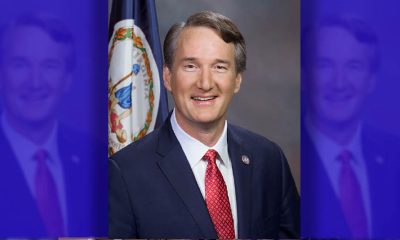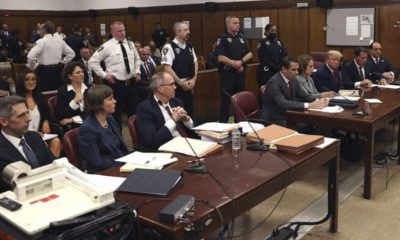Politics
In a Bind, Republicans Offer Vote on Homeland Security Bill

Senate Minority Leader Harry Reid of Nev. pauses during a news conference on Capitol Hill, Tuesday, Feb. 24, 2015, to urge Republicans to support a “clean bill” to fund the Homeland Security Department as that agencies budget expires later this week. The DHS budget is at a standstill over provisions attached to a Homeland Security spending bill aimed at blocking President Barack Obama’s executive actions on immigration. (AP Photo/J. Scott Applewhite)
DAVID ESPO, Associated Press
ERICA WERNER, Associated Press
WASHINGTON (AP) — A partial agency shutdown looming, Senate Republicans offered Tuesday to permit a vote on Homeland Security funding legislation stripped of immigration provisions backed by conservatives but strongly opposed by President Barack Obama and fellow Democrats.
“We could have that vote very quickly,” Majority Leader Mitch McConnell, R-Ky., said as his party struggled to escape a political predicament of their own making involving an agency with major anti-terrorism responsibilities.
McConnell said he did not know how the Republican-controlled House would respond if a stand-alone spending bill passed the Senate. Underscoring the realities of divided government, Senate Democratic leader Harry Reid of Nevada initially said he wouldn’t agree to the proposal unless it had the backing of House Speaker John Boehner, in a sign it would be likely to clear the House.
With House Republicans scheduled to meet privately Wednesday to discuss the issue, Boehner’s office issued a statement that neither accepted nor rejected the proposal McConnell outlined to end weeks of gridlock.
“The speaker has been clear: The House has acted, and now Senate Democrats need to stop hiding. Will they continue to block funding for the Department of Homeland Security or not?” said Boehner spokesman Michael Steel.
Some House conservatives criticized the proposal, but one lawmaker allied with the leadership predicted it might win approval. Noting that a federal judge in Texas has issued an order blocking implementation of Obama’s plan to shield millions of immigrants from deportation, Rep. Tom Cole of Oklahoma said the court had “effectively stopped the president’s executive action,” at least for now. “So I don’t think we’d run the risk of shutting down Homeland Security,” he added.
Even in the Senate, though, McConnell’s plan had its GOP critics.
Texas Sen. Ted Cruz, a tea party favorite and potential 2016 presidential contender, called it a mistake. “Congress is obliged to use every constitutional check and balance we have to rein in President Obama’s lawlessness,” he said in a statement.
Senate Republican officials said McConnell’s offer of a vote on a stand-alone funding bill also envisions a vote on a separate measure to repeal a directive from Obama last fall that shields about 4 million immigrants from deportation even though they live in the United States illegally. That measure would almost certainly fail in the Senate at the hands of Democrats.
At the same time, the proposal would eliminate an attempt by the House to repeal an earlier presidential order that allows tens of thousands of immigrants to remain in the country if they were brought here illegally as youngsters by their parents. Officials said Boehner’s office had been informed of McConnell’s plans before they were made public.
The maneuvering occurred as the president’s party raised the specter of terrorism and the Republicans countered that it was the Democrats who were preventing an orderly renewal of funding for the Homeland Security Department.
At a news conference a few hours before McConnell spoke, Sen. Amy Klobuchar, D-Minn., urged Republicans to “fund our security and not to send a message to al-Shabab that we’re going to shut down Homeland Security.”
Klobuchar’s state is home to the Mall of America, an enormous facility that was singled out as a potential terror target in a video released by al-Shabab, an Islamic militant group linked to the al-Qaida terrorist network. Homeland Security Secretary Jeh Johnson has urged anyone considering a trip to the shopping mall to be particularly careful.
For their part, Republicans sought to pin the blame on Democrats, pointing out they blocked Senate action four times on the combined funding-immigration bill.
They also accused Reid of shifting his demands after first seeking a vote on a stand-alone spending bill, then refraining from accepting McConnell’s offer.
In response, Democrats seemed to backtrack, suggesting they may well sign on to McConnell’s offer whether or not Boehner does.
But even Republicans said privately that they needed to put an end to a controversy that was likely to turn out badly for them.
The current stand-off dates to last fall, when Boehner told fellow Republicans they should allow the funding of Homeland Security without conditions until after the elections. By then, he said, Republicans would have more leverage to force a rollback in the president’s immigration policy.
Republicans won control of the Senate, but they lack the 60 votes needed to overcome Democratic blocking actions. As a result, they have been unable to force a vote on House-passed DHS funding legislation that includes the repeal of the immigration policies Obama put into effect in 2012 and last fall.
Among some Republicans, there was recognition that McConnell was offering as graceful a way out as possible.
“I just don’t know how we do it any other way,” said Sen. Lindsey Graham, R-S.C.
___
Associated Press writers Andrew Taylor, Steven Ohlemacher and Chuck Babington contributed to this report.
Copyright 2015 The Associated Press. All rights reserved. This material may not be published, broadcast, rewritten or redistributed.
Bay Area
MAYOR BREED ANNOUNCES $53 MILLION FEDERAL GRANT FOR SAN FRANCISCO’S HOMELESS PROGRAMS
San Francisco, CA – Mayor London N. Breed today announced that the U.S. Department of Housing and Urban Development (HUD) has awarded the city a $53.7 million grant to support efforts to renew and expand critical services and housing for people experiencing homelessness in San Francisco.

FOR IMMEDIATE RELEASE:
Wednesday, January 31, 2024
Contact: Mayor’s Office of Communications, mayorspressoffice@sfgov.org
***PRESS RELEASE***
MAYOR BREED ANNOUNCES $53 MILLION FEDERAL GRANT FOR SAN FRANCISCO’S HOMELESS PROGRAMS
HUD’s Continuum of Care grant will support the City’s range of critical services and programs, including permanent supportive housing, rapid re-housing, and improved access to housing for survivors of domestic violence
San Francisco, CA – Mayor London N. Breed today announced that the U.S. Department of Housing and Urban Development (HUD) has awarded the city a $53.7 million grant to support efforts to renew and expand critical services and housing for people experiencing homelessness in San Francisco.
HUD’s Continuum of Care (CoC) program is designed to support local programs with the goal of ending homelessness for individuals, families, and Transitional Age Youth.
This funding supports the city’s ongoing efforts that have helped more than 15,000 people exit homelessness since 2018 through City programs including direct housing placements and relocation assistance. During that time San Francisco has also increased housing slots by 50%. San Francisco has the most permanent supportive housing of any county in the Bay Area, and the second most slots per capita than any city in the country.
“In San Francisco, we have worked aggressively to increase housing, shelter, and services for people experiencing homelessness, and we are building on these efforts every day,” said Mayor London Breed. “Every day our encampment outreach workers are going out to bring people indoors and our City workers are connecting people to housing and shelter. This support from the federal government is critical and will allow us to serve people in need and address encampments in our neighborhoods.”
The funding towards supporting the renewal projects in San Francisco include financial support for a mix of permanent supportive housing, rapid re-housing, and transitional housing projects. In addition, the CoC award will support Coordinated Entry projects to centralize the City’s various efforts to address homelessness. This includes $2.1 million in funding for the Coordinated Entry system to improve access to housing for youth and survivors of domestic violence.
“This is a good day for San Francisco,” said Shireen McSpadden, executive director of the Department of Homelessness and Supportive Housing. “HUD’s Continuum of Care funding provides vital resources to a diversity of programs and projects that have helped people to stabilize in our community. This funding is a testament to our work and the work of our nonprofit partners.”
The 2024 Continuum of Care Renewal Awards Include:
- $42.2 million for 29 renewal PSH projects that serve chronically homeless, veterans, and youth
- $318,000 for one new PSH project, which will provide 98 affordable homes for low-income seniors in the Richmond District
- $445,00 for one Transitional Housing (TH) project serving youth
- $6.4 million dedicated to four Rapid Rehousing (RRH) projects that serve families, youth, and survivors of domestic violence
- $750,00 for two Homeless Management Information System (HMIS) projects
- $2.1 million for three Coordinated Entry projects that serve families, youth, chronically homeless, and survivors of domestic violence
In addition, the 2023 CoC Planning Grant, now increased to $1,500,000 from $1,250,000, was also approved. Planning grants are submitted non-competitively and may be used to carry out the duties of operating a CoC, such as system evaluation and planning, monitoring, project and system performance improvement, providing trainings, partner collaborations, and conducting the PIT Count.
“We are very appreciative of HUD’s support in fulfilling our funding request for these critically important projects for San Francisco that help so many people trying to exit homelessness,” said Del Seymour, co-chair of the Local Homeless Coordinating Board. “This funding will make a real difference to people seeking services and support in their journey out of homelessness.”
In comparison to last year’s competition, this represents a $770,000 increase in funding, due to a new PSH project that was funded, an increase in some unit type Fair Market Rents (FMRs) and the larger CoC Planning Grant. In a year where more projects had to compete nationally against other communities, this represents a significant increase.
Nationally, HUD awarded nearly $3.16 billion for over 7,000 local homeless housing and service programs including new projects and renewals across the United States.
Activism
Oakland Post: Week of April 17 – 23, 2024
The printed Weekly Edition of the Oakland Post: Week of April 17 – 23, 2024

To enlarge your view of this issue, use the slider, magnifying glass icon or full page icon in the lower right corner of the browser window. ![]()
Barbara Lee
Congresswoman Barbara Lee Issues Statement on Deaths of Humanitarian Aid Volunteers in Gaza
On April 2, a day after an Israeli airstrike erroneously killed seven employees of World Central Kitchen (WCK), a humanitarian organization delivering aid in the Gaza Strip, a statement was release by Rep. Barbara Lee (D-CA-12). “This is a devastating and avoidable tragedy. My prayers go to the families and loved ones of the selfless members of the World Central Kitchen team whose lives were lost,” said Lee.

By California Black Media
On April 2, a day after an Israeli airstrike erroneously killed seven employees of World Central Kitchen (WCK), a humanitarian organization delivering aid in the Gaza Strip, a statement was release by Rep. Barbara Lee (D-CA-12).
“This is a devastating and avoidable tragedy. My prayers go to the families and loved ones of the selfless members of the World Central Kitchen team whose lives were lost,” said Lee.
The same day, it was confirmed by the organization that the humanitarian aid volunteers were killed in a strike carried out by Israel Defense Forces (IDF). Prior to the incident, members of the team had been travelling in two armored vehicles marked with the WCF logo and they had been coordinating their movements with the IDF. The group had successfully delivered 10 tons of humanitarian food in a deconflicted zone when its convoy was struck.
“This is not only an attack against WCK. This is an attack on humanitarian organizations showing up in the direst situations where food is being used as a weapon of war. This is unforgivable,” said Erin Gore, chief executive officer of World Central Kitchen.
The seven victims included a U.S. citizen as well as others from Australia, Poland, the United Kingdom, Canada, and Palestine.
Lee has been a vocal advocate for a ceasefire in Gaza and has supported actions by President Joe Biden to airdrop humanitarian aid in the area.
“Far too many civilians have lost their lives as a result of Benjamin Netanyahu’s reprehensible military offensive. The U.S. must join with our allies and demand an immediate, permanent ceasefire – it’s long overdue,” Lee said.
-

 Activism4 weeks ago
Activism4 weeks agoOakland Post: Week of March 27 – April 2, 2024
-

 #NNPA BlackPress4 weeks ago
#NNPA BlackPress4 weeks agoCOMMENTARY: D.C. Crime Bill Fails to Address Root Causes of Violence and Incarceration
-

 #NNPA BlackPress4 weeks ago
#NNPA BlackPress4 weeks agoFrom Raids to Revelations: The Dark Turn in Sean ‘Diddy’ Combs’ Saga
-

 #NNPA BlackPress4 weeks ago
#NNPA BlackPress4 weeks agoCOMMENTARY: Lady Day and The Lights!
-

 #NNPA BlackPress4 weeks ago
#NNPA BlackPress4 weeks agoMayor, City Council President React to May 31 Closing of Birmingham-Southern College
-

 #NNPA BlackPress4 weeks ago
#NNPA BlackPress4 weeks agoBaltimore Key Bridge Catastrophe: A City’s Heartbreak and a Nation’s Alarm
-

 #NNPA BlackPress4 weeks ago
#NNPA BlackPress4 weeks agoBaltimore’s Key Bridge Struck by Ship, Collapses into Water
-

 #NNPA BlackPress4 weeks ago
#NNPA BlackPress4 weeks agoBeloved Actor and Activist Louis Cameron Gossett Jr. Dies at 87
Politics
In a Bind, Republicans Offer Vote on Homeland Security Bill

Senate Minority Leader Harry Reid of Nev. pauses during a news conference on Capitol Hill, Tuesday, Feb. 24, 2015, to urge Republicans to support a “clean bill” to fund the Homeland Security Department as that agencies budget expires later this week. The DHS budget is at a standstill over provisions attached to a Homeland Security spending bill aimed at blocking President Barack Obama’s executive actions on immigration. (AP Photo/J. Scott Applewhite)
DAVID ESPO, Associated Press
ERICA WERNER, Associated Press
WASHINGTON (AP) — A partial agency shutdown looming, Senate Republicans offered Tuesday to permit a vote on Homeland Security funding legislation stripped of immigration provisions backed by conservatives but strongly opposed by President Barack Obama and fellow Democrats.
“We could have that vote very quickly,” Majority Leader Mitch McConnell, R-Ky., said as his party struggled to escape a political predicament of their own making involving an agency with major anti-terrorism responsibilities.
McConnell said he did not know how the Republican-controlled House would respond if a stand-alone spending bill passed the Senate. Underscoring the realities of divided government, Senate Democratic leader Harry Reid of Nevada initially said he wouldn’t agree to the proposal unless it had the backing of House Speaker John Boehner, in a sign it would be likely to clear the House.
With House Republicans scheduled to meet privately Wednesday to discuss the issue, Boehner’s office issued a statement that neither accepted nor rejected the proposal McConnell outlined to end weeks of gridlock.
“The speaker has been clear: The House has acted, and now Senate Democrats need to stop hiding. Will they continue to block funding for the Department of Homeland Security or not?” said Boehner spokesman Michael Steel.
Some House conservatives criticized the proposal, but one lawmaker allied with the leadership predicted it might win approval. Noting that a federal judge in Texas has issued an order blocking implementation of Obama’s plan to shield millions of immigrants from deportation, Rep. Tom Cole of Oklahoma said the court had “effectively stopped the president’s executive action,” at least for now. “So I don’t think we’d run the risk of shutting down Homeland Security,” he added.
Even in the Senate, though, McConnell’s plan had its GOP critics.
Texas Sen. Ted Cruz, a tea party favorite and potential 2016 presidential contender, called it a mistake. “Congress is obliged to use every constitutional check and balance we have to rein in President Obama’s lawlessness,” he said in a statement.
Senate Republican officials said McConnell’s offer of a vote on a stand-alone funding bill also envisions a vote on a separate measure to repeal a directive from Obama last fall that shields about 4 million immigrants from deportation even though they live in the United States illegally. That measure would almost certainly fail in the Senate at the hands of Democrats.
At the same time, the proposal would eliminate an attempt by the House to repeal an earlier presidential order that allows tens of thousands of immigrants to remain in the country if they were brought here illegally as youngsters by their parents. Officials said Boehner’s office had been informed of McConnell’s plans before they were made public.
The maneuvering occurred as the president’s party raised the specter of terrorism and the Republicans countered that it was the Democrats who were preventing an orderly renewal of funding for the Homeland Security Department.
At a news conference a few hours before McConnell spoke, Sen. Amy Klobuchar, D-Minn., urged Republicans to “fund our security and not to send a message to al-Shabab that we’re going to shut down Homeland Security.”
Klobuchar’s state is home to the Mall of America, an enormous facility that was singled out as a potential terror target in a video released by al-Shabab, an Islamic militant group linked to the al-Qaida terrorist network. Homeland Security Secretary Jeh Johnson has urged anyone considering a trip to the shopping mall to be particularly careful.
For their part, Republicans sought to pin the blame on Democrats, pointing out they blocked Senate action four times on the combined funding-immigration bill.
They also accused Reid of shifting his demands after first seeking a vote on a stand-alone spending bill, then refraining from accepting McConnell’s offer.
In response, Democrats seemed to backtrack, suggesting they may well sign on to McConnell’s offer whether or not Boehner does.
But even Republicans said privately that they needed to put an end to a controversy that was likely to turn out badly for them.
The current stand-off dates to last fall, when Boehner told fellow Republicans they should allow the funding of Homeland Security without conditions until after the elections. By then, he said, Republicans would have more leverage to force a rollback in the president’s immigration policy.
Republicans won control of the Senate, but they lack the 60 votes needed to overcome Democratic blocking actions. As a result, they have been unable to force a vote on House-passed DHS funding legislation that includes the repeal of the immigration policies Obama put into effect in 2012 and last fall.
Among some Republicans, there was recognition that McConnell was offering as graceful a way out as possible.
“I just don’t know how we do it any other way,” said Sen. Lindsey Graham, R-S.C.
___
Associated Press writers Andrew Taylor, Steven Ohlemacher and Chuck Babington contributed to this report.
Copyright 2015 The Associated Press. All rights reserved. This material may not be published, broadcast, rewritten or redistributed.
Bay Area
MAYOR BREED ANNOUNCES $53 MILLION FEDERAL GRANT FOR SAN FRANCISCO’S HOMELESS PROGRAMS
San Francisco, CA – Mayor London N. Breed today announced that the U.S. Department of Housing and Urban Development (HUD) has awarded the city a $53.7 million grant to support efforts to renew and expand critical services and housing for people experiencing homelessness in San Francisco.

FOR IMMEDIATE RELEASE:
Wednesday, January 31, 2024
Contact: Mayor’s Office of Communications, mayorspressoffice@sfgov.org
***PRESS RELEASE***
MAYOR BREED ANNOUNCES $53 MILLION FEDERAL GRANT FOR SAN FRANCISCO’S HOMELESS PROGRAMS
HUD’s Continuum of Care grant will support the City’s range of critical services and programs, including permanent supportive housing, rapid re-housing, and improved access to housing for survivors of domestic violence
San Francisco, CA – Mayor London N. Breed today announced that the U.S. Department of Housing and Urban Development (HUD) has awarded the city a $53.7 million grant to support efforts to renew and expand critical services and housing for people experiencing homelessness in San Francisco.
HUD’s Continuum of Care (CoC) program is designed to support local programs with the goal of ending homelessness for individuals, families, and Transitional Age Youth.
This funding supports the city’s ongoing efforts that have helped more than 15,000 people exit homelessness since 2018 through City programs including direct housing placements and relocation assistance. During that time San Francisco has also increased housing slots by 50%. San Francisco has the most permanent supportive housing of any county in the Bay Area, and the second most slots per capita than any city in the country.
“In San Francisco, we have worked aggressively to increase housing, shelter, and services for people experiencing homelessness, and we are building on these efforts every day,” said Mayor London Breed. “Every day our encampment outreach workers are going out to bring people indoors and our City workers are connecting people to housing and shelter. This support from the federal government is critical and will allow us to serve people in need and address encampments in our neighborhoods.”
The funding towards supporting the renewal projects in San Francisco include financial support for a mix of permanent supportive housing, rapid re-housing, and transitional housing projects. In addition, the CoC award will support Coordinated Entry projects to centralize the City’s various efforts to address homelessness. This includes $2.1 million in funding for the Coordinated Entry system to improve access to housing for youth and survivors of domestic violence.
“This is a good day for San Francisco,” said Shireen McSpadden, executive director of the Department of Homelessness and Supportive Housing. “HUD’s Continuum of Care funding provides vital resources to a diversity of programs and projects that have helped people to stabilize in our community. This funding is a testament to our work and the work of our nonprofit partners.”
The 2024 Continuum of Care Renewal Awards Include:
- $42.2 million for 29 renewal PSH projects that serve chronically homeless, veterans, and youth
- $318,000 for one new PSH project, which will provide 98 affordable homes for low-income seniors in the Richmond District
- $445,00 for one Transitional Housing (TH) project serving youth
- $6.4 million dedicated to four Rapid Rehousing (RRH) projects that serve families, youth, and survivors of domestic violence
- $750,00 for two Homeless Management Information System (HMIS) projects
- $2.1 million for three Coordinated Entry projects that serve families, youth, chronically homeless, and survivors of domestic violence
In addition, the 2023 CoC Planning Grant, now increased to $1,500,000 from $1,250,000, was also approved. Planning grants are submitted non-competitively and may be used to carry out the duties of operating a CoC, such as system evaluation and planning, monitoring, project and system performance improvement, providing trainings, partner collaborations, and conducting the PIT Count.
“We are very appreciative of HUD’s support in fulfilling our funding request for these critically important projects for San Francisco that help so many people trying to exit homelessness,” said Del Seymour, co-chair of the Local Homeless Coordinating Board. “This funding will make a real difference to people seeking services and support in their journey out of homelessness.”
In comparison to last year’s competition, this represents a $770,000 increase in funding, due to a new PSH project that was funded, an increase in some unit type Fair Market Rents (FMRs) and the larger CoC Planning Grant. In a year where more projects had to compete nationally against other communities, this represents a significant increase.
Nationally, HUD awarded nearly $3.16 billion for over 7,000 local homeless housing and service programs including new projects and renewals across the United States.
Activism
Oakland Post: Week of April 17 – 23, 2024
The printed Weekly Edition of the Oakland Post: Week of April 17 – 23, 2024

To enlarge your view of this issue, use the slider, magnifying glass icon or full page icon in the lower right corner of the browser window. ![]()
Barbara Lee
Congresswoman Barbara Lee Issues Statement on Deaths of Humanitarian Aid Volunteers in Gaza
On April 2, a day after an Israeli airstrike erroneously killed seven employees of World Central Kitchen (WCK), a humanitarian organization delivering aid in the Gaza Strip, a statement was release by Rep. Barbara Lee (D-CA-12). “This is a devastating and avoidable tragedy. My prayers go to the families and loved ones of the selfless members of the World Central Kitchen team whose lives were lost,” said Lee.

By California Black Media
On April 2, a day after an Israeli airstrike erroneously killed seven employees of World Central Kitchen (WCK), a humanitarian organization delivering aid in the Gaza Strip, a statement was release by Rep. Barbara Lee (D-CA-12).
“This is a devastating and avoidable tragedy. My prayers go to the families and loved ones of the selfless members of the World Central Kitchen team whose lives were lost,” said Lee.
The same day, it was confirmed by the organization that the humanitarian aid volunteers were killed in a strike carried out by Israel Defense Forces (IDF). Prior to the incident, members of the team had been travelling in two armored vehicles marked with the WCF logo and they had been coordinating their movements with the IDF. The group had successfully delivered 10 tons of humanitarian food in a deconflicted zone when its convoy was struck.
“This is not only an attack against WCK. This is an attack on humanitarian organizations showing up in the direst situations where food is being used as a weapon of war. This is unforgivable,” said Erin Gore, chief executive officer of World Central Kitchen.
The seven victims included a U.S. citizen as well as others from Australia, Poland, the United Kingdom, Canada, and Palestine.
Lee has been a vocal advocate for a ceasefire in Gaza and has supported actions by President Joe Biden to airdrop humanitarian aid in the area.
“Far too many civilians have lost their lives as a result of Benjamin Netanyahu’s reprehensible military offensive. The U.S. must join with our allies and demand an immediate, permanent ceasefire – it’s long overdue,” Lee said.
-

 Activism4 weeks ago
Activism4 weeks agoOakland Post: Week of March 27 – April 2, 2024
-

 #NNPA BlackPress4 weeks ago
#NNPA BlackPress4 weeks agoCOMMENTARY: D.C. Crime Bill Fails to Address Root Causes of Violence and Incarceration
-

 #NNPA BlackPress4 weeks ago
#NNPA BlackPress4 weeks agoFrom Raids to Revelations: The Dark Turn in Sean ‘Diddy’ Combs’ Saga
-

 #NNPA BlackPress4 weeks ago
#NNPA BlackPress4 weeks agoCOMMENTARY: Lady Day and The Lights!
-

 #NNPA BlackPress4 weeks ago
#NNPA BlackPress4 weeks agoMayor, City Council President React to May 31 Closing of Birmingham-Southern College
-

 #NNPA BlackPress4 weeks ago
#NNPA BlackPress4 weeks agoBaltimore Key Bridge Catastrophe: A City’s Heartbreak and a Nation’s Alarm
-

 #NNPA BlackPress4 weeks ago
#NNPA BlackPress4 weeks agoBaltimore’s Key Bridge Struck by Ship, Collapses into Water
-

 #NNPA BlackPress4 weeks ago
#NNPA BlackPress4 weeks agoBeloved Actor and Activist Louis Cameron Gossett Jr. Dies at 87






















































Leave a Reply